Exploring roads less travelled in the cooler parts of Australia and New Zealand
Home Articles Places Categories Videos Maps About Sitemap

Plenty of people like the idea of cruising through the great outdoors in a campervan - but not in frigid winter weather. Having done a number of winter campervans trips to some of Australia's coldest parts, I've experienced the pros and cons of this mode of travel in conditions that most would consider too cold and inclement. Are campervans and cold weather incompatible? Here I take an honest look at some of the challenges ... and some of the unexpected rewards.
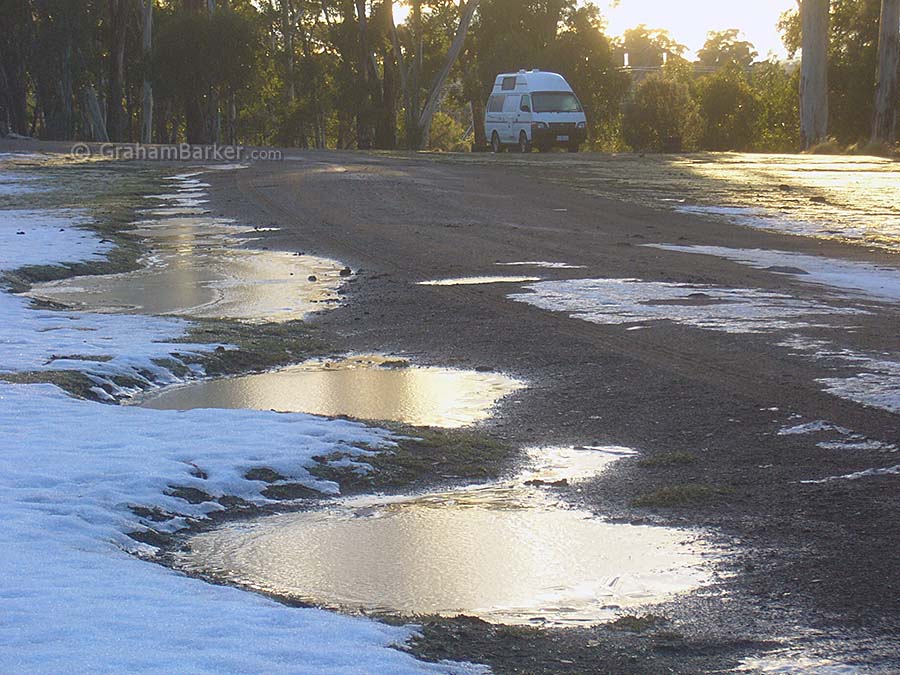
Remnant snow and frozen puddles at Pumphouse Bay campground, Tasmania - with the van in prime position overlooking Arthur's Lake
Tasmania has been the scene of most of my campervan journeys, with eastern Victoria and southern New South Wales accounting for another. Each trip has averaged about three weeks and been in winter. Being a fan of chilly weather and mountains has drawn me to higher - and colder - ground in all these places. In other words, I've had more than just a taste of cold winter campervan travel.
The fact that I keep doing it reveals my opinion: that the rewards outweigh the costs. However it can't be denied that there are real challenges, and I'll start with those. Bear in mind that my experiences are in small vans for up to three people, and may not apply to bus-sized mobile homes.
This is the most obvious thing which puts people off. It can get really cold in an unheated van, unless you're parked in a powered caravan park site and can plug in an electric heater.
How cold? On my various winter trips to Tasmania the temperature inside the van averaged between zero and five degrees for most of the nights, most of the time. That is literally like living inside a refrigerator. On a few occasions it dipped below freezing inside, though not by much. However, that was as cold as it got. Coastal areas were milder, as were most of my nights in Victoria. And even in mid winter, weather varies: cold spells are punctuated by milder periods.
As a general rule, on a calm night with windows closed the van would remain a couple of degrees warmer than outside, but in windy conditions it would be close to the outside temperature.
I got by happily with lots of warm clothing and a good sleeping bag. In fact I grew so accustomed to dressing for the cold that when I stayed at a powered sites I didn't bother using the van's electric heater (except one night near Great Lake when it was minus seven). The cold wasn't an issue for me, but I can appreciate how it would bother others who don't share my biology.
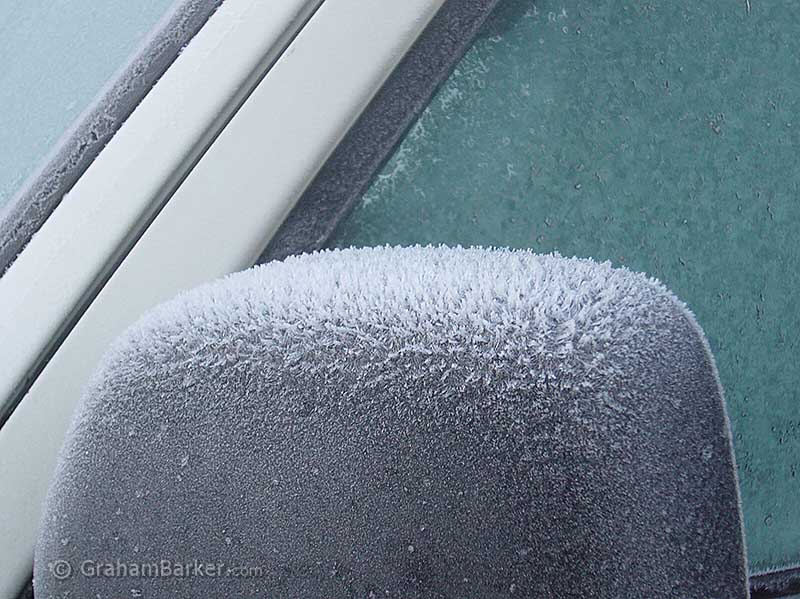
Most of Australia's roads don't get affected by ice or snow. But if you explore the mountainous bits of Tasmania or the south east in winter, you'll occasionally come across roads which are closed by snow, or a bit dodgy due to ice, slush or slippery gravel.
This can limit how much of the countryside you get to see - especially in a hired vehicle. Rental companies usually impose restrictions on gravel roads, and often on travel to snow-prone areas in the snow season, regardless of whether there is snow or not.
I've been fortunate in Tasmania to hire from companies which allowed driving on gravel roads, but even then I've been kept off some roads by safety concerns. One was the gravel up to Mt Field - it's a little steep and slippery for campervans in winter.
You can easily get caught by surprise, too. I drove the gravel road from Oatlands up to Lake Crescent because it had been many days since the last snow and someone told me it would be clear. It wasn't. The start of the road was excellent, but then it narrowed and began climbing steadily. When it turned to a thin layer of mud covered in slushy snow, there was no room to turn around and I didn't dare slow down too much in case I lost traction on the uphill slope. It was an intense driving experience, which fortunately ended safely.
The photo gives an idea of the surface, but only after it cleared and flattened out enough for me to risk taking one hand off the wheel to use the camera. Outside winter, a road like this would be okay, but in winter it was no place for a campervan.
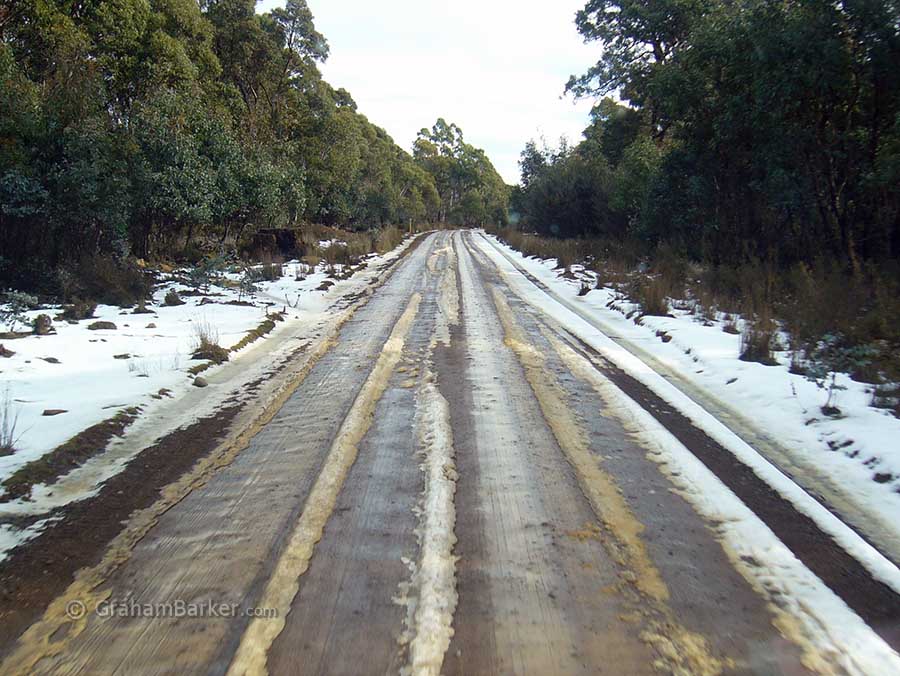
Muddy gravel with slush on the road to Lake Crescent, central Tasmania.
On cold mornings, windows can become frosted or wet with condensation. In cold conditions this can take a lot of scraping and wiping, with the engine running and heater on for quite a while before the windows are clear enough to drive safely.
This can happen to cars in the cities too, but when touring the colder places in a campervan it is a much more regular occurrence. It's not a huge deal, but makes it harder to do a quick getaway. If you don't need to get moving quickly (and should you, on a holiday?), then it's just a minor nuisance. It helps if you can park so that the windscreen catches some early morning sun.
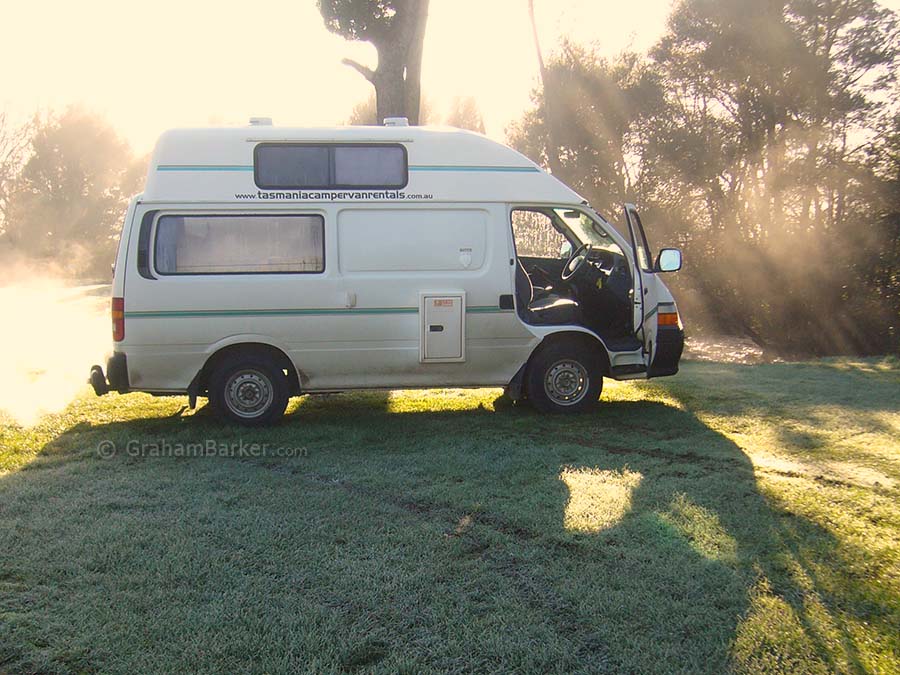
Waiting for the van to de-fog on a frosty morning near Mole Creek, Tasmania
Unless you're staying up in the snow country, this is rarely likely to be a problem ... but it can happen. I've had the van's internal water tap freeze on me when on Tasmania's central plateau, which has consistently sub-zero nights in winter. However that was just one rare occurrence in many trips, and it wasn't even inconvenient because I had a bottle of water in the fridge which stayed liquid. It is a possible risk for those spending extended time in the coldest of places, but for most winter campervan tourers it is just a novelty not likely to be encountered.
If you're happy to dress up to keep warm, and you accept that some roads will be off limits, then travelling by campervan can have advantages in cold winter conditions. I've written on another page about the advantages of winter travel in general. Here then are some positives which relate specifically to campervans.
A car parked in the sun on anything but the chilliest of days can quickly heat up to unbearable temperatures. Campervans may heat up a little slower, but can also become like ovens under the sun's glare, making them difficult to live in comfortably during the daylight hours.
In colder southern areas during winter this is something you rarely need to worry about. You won't be forced out of bed at 6am by a summer sun roasting the van. In fact a van parked in the sun may be pleasantly warm during the day, and comfortable to use, rather than something you need to avoid until the sun goes down or you can find shade and a cool breeze.
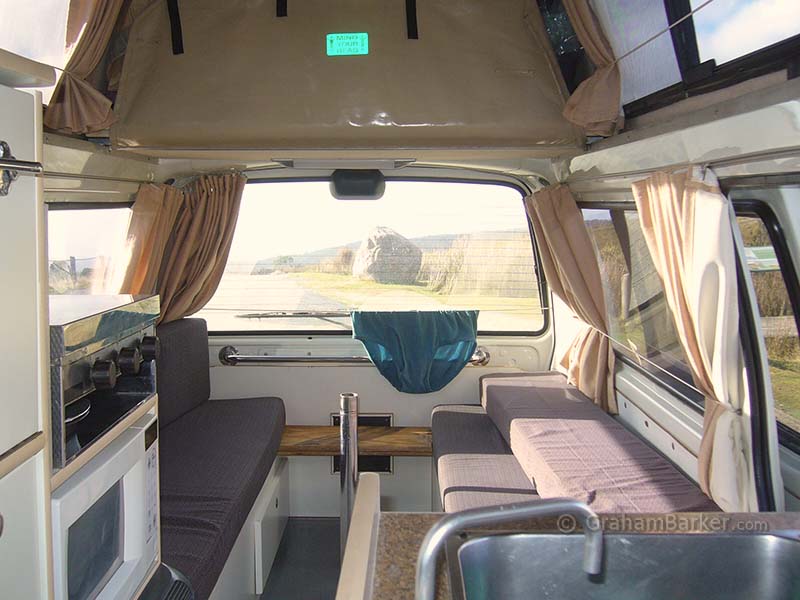
Winter daytime inside a campervan - not too hot for sitting comfortably, but warm enough for drying underwear
I've read online forums where people complain about flies or mosquitoes in their campervans, and the inadequacy of fly screens - if there are any. In most of Australia in the warmer months this can be a real problem. In winter in the colder areas, it isn't.
I wouldn't claim that winter cold places are completely free of insects, but they are drastically reduced in number, and also less active. Many times I've started and ended the day sitting comfortably in my van with the side door open, enjoying fresh air and unobstructed views without being bothered by insects.
If the inside of a campervans chills to somewhere near the temperature of a refrigerator, then the stuff inside will stay cool without the fridge needing to be on all night. This has two clear benefits.
First is the noise - most campervans fridges make a bit of noise on the cooling cycle. It's not much, but can become annoying at night if it is otherwise peaceful and quiet. Not needing to keep the fridge running avoids this small irritation.
The other benefit is the reduced need for power. Recharging the battery that powers the fridge requires either a decent amount of daily driving, or being plugged into a powered site in a caravan park overnight. Not needing to power the fridge (other than when driving during the daytime) reduces the dependence on recharging ... which leads to another benefit.
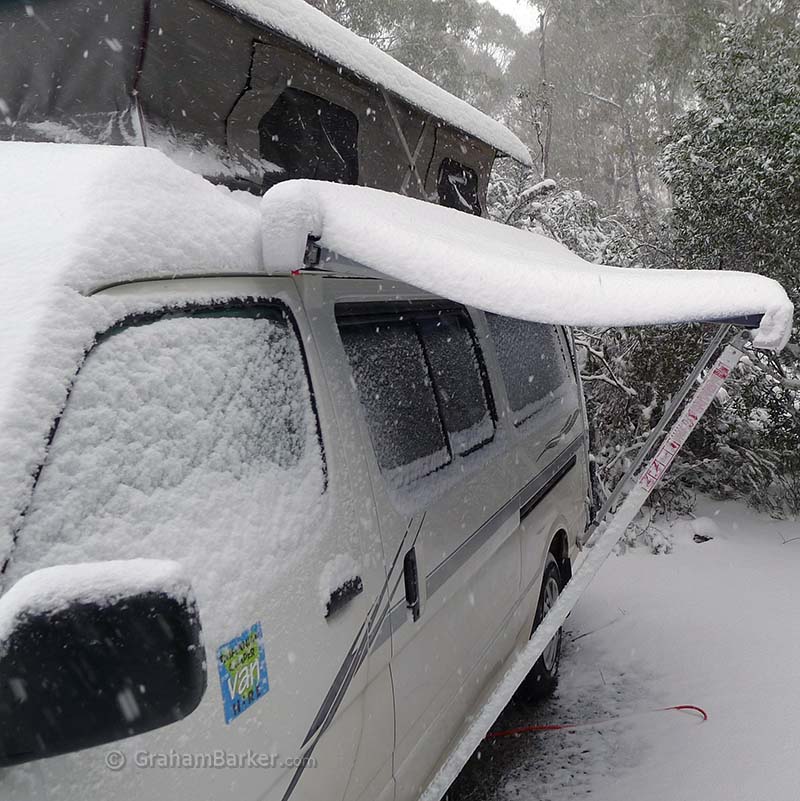
Campervan in snow at Cradle Mountain campground, Tasmania ... I didn't need to run the fridge here, day or night!
There are various reasons for parking overnight in caravan parks. The two biggest ones, for me at least, are being able to plug into a power supply, and having access to proper shower facilities.
Not needing to run the fridge at night means you don't need to charge the battery as regularly. And if you can be flexible in matters of hygiene, having a shower every day may be unnecessary in cold weather if you're not getting sweaty. Of course you'll need to have a hot shower or hook up to mains power sometime ... it just doesn't need to be every day, as it might be in summer.
Mileage will vary, but in Tasmanian winters I've found every second or third night in a caravan park to be sufficient to keep all gadgets charged and the body clean. Well, clean enough for a holiday!
Why is this important? Because it gives you more freedom to stay overnight in places other than caravan parks. Places like camp grounds in national parks and nature reserves, or any scenic spot where camping is not prohibited. This really enables you to get out amongst the scenery, which is largely the point of using a campervan. Not having to pay caravan park fees every night also helps.
Off season travel means fewer crowds, and this pays off when spending the night in campgrounds in national parks and reserves. There are fewer people making noise and competing for access to toilets ... and less competition for the best parking spots.
Many are the times I've arrived in a scenic Tasmanian camping area to find it unoccupied. Usually I've claimed the spot with the best views, but when shelter or level ground was more important I’ve chosen accordingly. The point is, you get to choose in quiet winter periods, whereas in busy summer holidays you might have to settle for whatever spots nobody else wanted.
This can work in caravan parks too, which are rarely deserted in winter even in Tasmania (although I did once have the Queenstown caravan park all to myself). In places like Devonport and Swansea I've occupied campervan sites right next to the beach, which would be harder to do in summer.
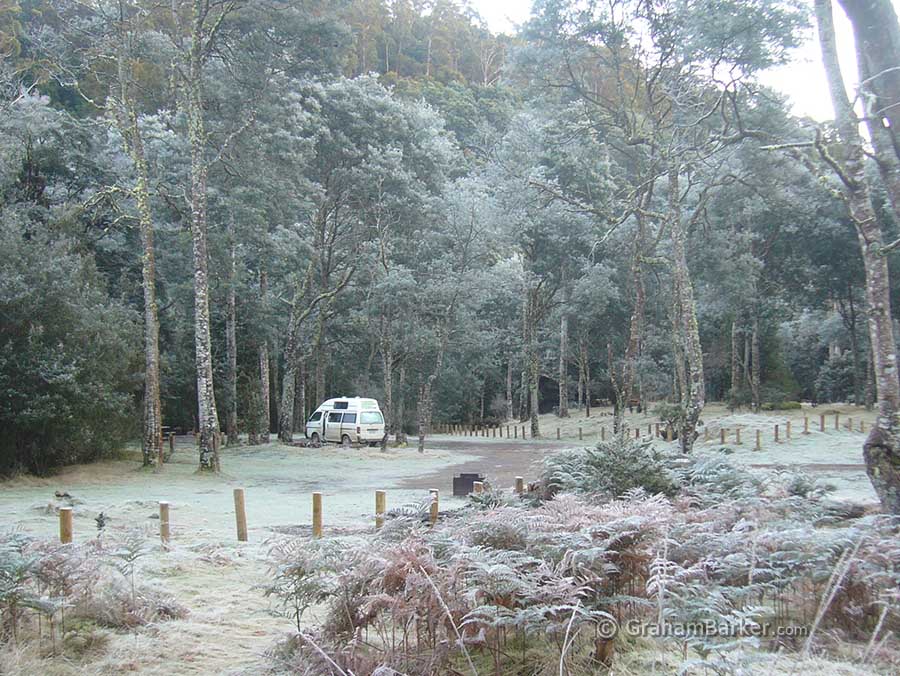
Tasmania's Lower Liffey campground on a frosty morning. With no competition for spaces, I could park near the river to enjoy its soothing gurgling sounds all night.
Money may not be everything … but a shortage of it can severely limit the length of a holiday, or prevent you having one. One of the great advantages of hiring a campervan in the off-season is cost. Prices in colder areas can be much cheaper in winter than in the more popular summer season, making longer trips more feasible.
As an example, one campervan I hired in Tasmania was $50 per day in winter, compared to around $120 per day in summer for the exact same van. Rates vary widely between companies and vary with van, location, length of hire, and other factors ... so don't take my savings as being the norm. It is just an example of how much rates can differ for those willing to hire a campervan at times of year when most don't want to.
In conclusion, I would say that campervans can be a very suitable means of winter travel in the colder southern parts of Australia. At least it is for those who can cope with cold weather and accept that some roads may be off limits. But I don't mind if most people continue to avoid campervans in winter - it leaves the campgrounds quiet and the vans cheaper for others like me!